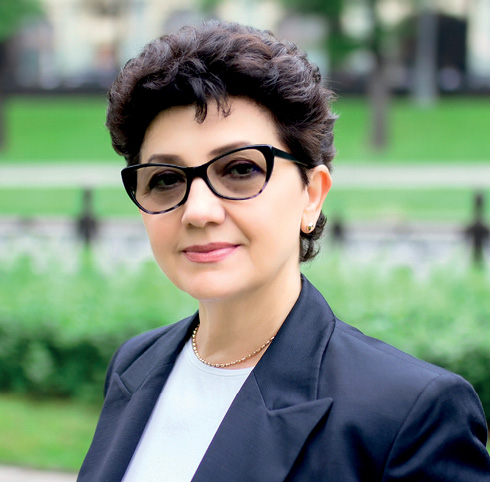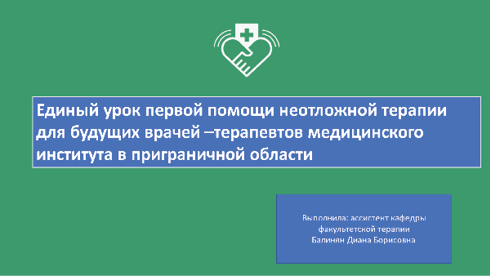ADDRESS TO THE READERS
PEDAGOGY OF DEVELOPMENT AND COOPERATION
ChatGPT is a language model that has many benefits and applications in healthcare and medicine. It can be useful for medical professionals in various fields, including research, diagnostics, patient monitoring, and education. However, the use of GPT chat also entails a number of ethical issues and limitations, such as accuracy, plagiarism, copyright infringement and bias.
The study aim was to assess the potential of passing primary accreditation and primary specialized accreditation using artificial intelligence — ChatGPT, and the Yandex search engine.
The study consisted of 2 stages. The study revealed that using ChatGPT made it possible to pass General Medicine primary accreditation and Cardiology primary specialized accreditation. Using ChatGPT4 significantly accelerated the test. However, despite the significant acceleration of artificial intelligence, the quality of the answers does not allow successful accreditation in all specialties. A tendency was noted that the subjects began to trust the bot's answers to a greater extent without checking it.
The article summarizes the experience of modern teaching methods at the Department of Hospital Internal Medicine with a course of rehabilitation, physiotherapy and sports medicine of the Siberian State Medical University. The methods of art and multitherapy, flipped classroom, ways of using biomarkers in practice, including a gastropanel, diagnostic indices and scales as prognostic values for the course and outcome of diseases are considered. The methods of teacher-simulated patient and bedside teaching with an "unknown" patient are considered, as well as the potential of problem-based classes and integrative lectures. The potential of distance teaching technologies is expanded.
Aim. To study the long-term knowledge retention in medical genetic disciplines and its reference to teaching format and learning styles.
Material and methods. Knowledge retention was assessed in General Medicine students (n=63; men, 16%; women, 84%). The data was obtained in the 4th year full-time students and 1st year mixed (in-person and distance) students (retrospectively). Knowledge retention was assessed by analyzing academic performance tests. Learning styles were studied using the Learning Styles Questionnaire (LSQ).
Results. When comparing the knowledge retention in medical and biological disciplines studied in person (Genetics in year 1) and online (Parasitology in year 1), no significant difference was found. At the same time, after updating the genetics knowledge obtained in year 1 in the 4th year, students showed better results in the Medical and Biological Consulting course than in "factual" reproduction of knowledge. Reflective and theoretician learning styles dominated in 4th year students.
Conclusion. It is necessary to develop professional thinking associated with the logic of professional activity and allowing one to quickly update what has been studied and supply the deficient knowledge. The assumption about the favorable influence of the theoretician and reflective learning styles needs verification in further studies.
The article discusses the use of simulation training technologies within professional medical education of residents and practitioners, including in the field of Obstetrics and Gynecology. The authors describe the advantages of simulation training technologies and basic principles of educational process. The article provides examples of the most successful forms of classes using simulators of varying levels of realism. Solutions of main organizational and methodological problems of using simulation training technologies and the prospects for the development of presented methods are determined.
This research aimed to analyze model for strengthening innovative work behavior of North Sumatra teachers in facing the challenges of Society 5.0 era. Quantitative and SEM methods were adopted with Partial Least Squares Modeling (PLS-SEM) through transformational leadership, creative self-efficacy, proactive personality, and organizational support. In this context, new opportunities were obtained for a deeper understanding of the complex relationships between key variables influencing innovative work behavior model of teachers. Additionally, the research sample comprised 200 teachers in North Sumatra Province, Indonesia. The data analysis used the SEM method with PLS-SEM. The results showed that transformational leadership, creative self-efficacy, proactive personality, and organizational support had a positive and significant effect on innovative work behavior. Concerning the implications, innovative work behavior of teachers served as a critical factor in ensuring the quality of education was adaptive and relevant to the demands of Society 5.0 era. Policymakers could use the result to design more effective training and development programs, focusing on transformational leadership, strengthening creative self-efficacy, and providing better organizational support.
THE WINNERS OF THE ALL-RUSSIAN COMPETITION OF PEDAGOGICAL IDEAS OF THERAPY TEACHERS
В ПОМОЩЬ ПРЕПОДАВАТЕЛЮ
State of the Art (SotA) literature reviews are chronological overviews of the current status of knowledge about a phenomenon and suggest directions for future research. The publication discusses the methodological principles of writing this type of review.
ISSN 2619-0125 (Online)




























































